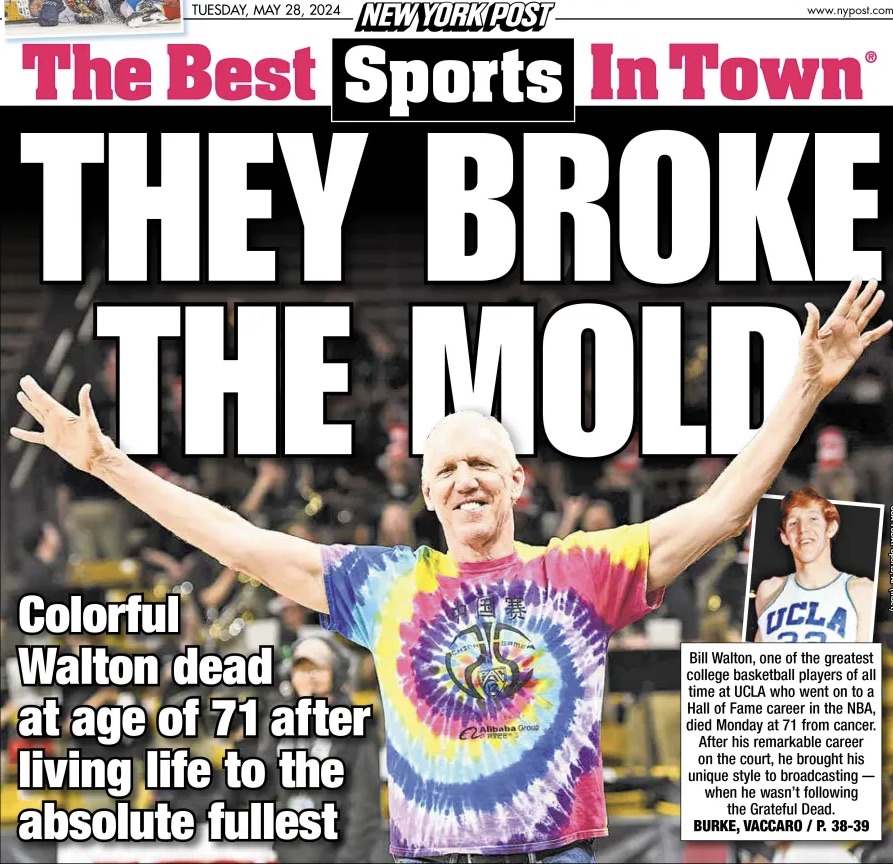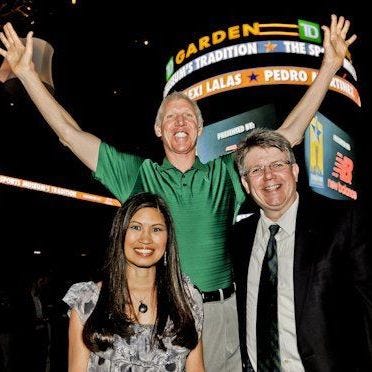
By TERRY LYONS, Editor of Digital Sports Desk
BOSTON – The first thing I thought when I heard the terrible Memorial Day news of Bill Walton’s death was of Bill’s wonderful wife, Lori. Then, a flashback, worthy of an Orson Welles Hollywood movie. It came from two summers ago at a Basketball Hall of Fame press conference at Mohegan Sun when Bill and Lori sauntered into the auditorium just as the function began. Bill, ever so politely, asked me to scoot over a bit so the three of us could sit together in a comfortable booth on the venue’s concourse floor. A perfect vantage point.
After all the many years of working with the NBA and alongside of the best of the best in commissioners, executives, coaches, players and media, it meant so much that BILL WALTON felt comfortable enough, welcome enough and secure in our friendship to sit right down and join little old me.
That flashback quickly dissolved into a highlight film, mostly of a player in UCLA Bruins Blue and Gold, but a little highlight reel of two Celtics – Bill and Larry Bird – in Green and White. The UCLA segment first, of course, reelin’ in the years of the famed 21-of-22 FG performance. It was Walton’s greatest game – the 1973 NCAA national championship against Memphis State. Walton, UCLA’s starting center, was in foul trouble in the first half, but went on to score 44 points on 21-for-22 shooting, while he grabbed 13 rebounds, had two assists and a blocked shot in UCLA’s 87-66 victory. It was the school’s ninth title in 10 years.
Fast forward a year, and the Red and White of North Carolina State and David Thompson eeked into the picture, defeating Walton’s Bruins in the NCAA championship of 1974.
In between, on January 26, 1974, John Shumate, Adrian Dantley and Gary Brokaw’s Notre Dame team ended UCLA’s 88-game winning streak with a 71-70 victory in South Bend, Indiana. It was a devastating loss for Walton’s Bruins as they’d drop two more regular season games, their lost weekend of February 15-16, 1974, losing at Oregon State and Oregon on consecutive nights. The NC State game would be their fourth loss vs. 26 wins.
Walton went 86-4 (30-0; 30-0; 26-4) in his college career. If you add the two title-winning seasons, the first 13 games of his senior season at UCLA, his season on the Bruins’ freshman team, and his final two varsity seasons at Helix High School in La Mesa, Walton owned a personal 142-game winning streak.
That thought brought me back to reality and the need to reckon with the fact I’d never see Bill again. The stream of ESPN 30-for-30s airing on my TV screen in tribute further proved the point. The rest of my days, my memories of Bill Walton – playing basketball, talking basketball, talking music or politics or the injustices in this world – would need to air on the reel-to-reel in my mind, tucked right next to the music of the late Jerry Garcia and long ago memories of the Grateful Dead.

I woke up on May 28, hoping it was a bad dream.
It wasn’t.
Bill Walton’s name sat atop the trending topics of Yahoo news and X. The story of his death was summed up by CBS’ Dana Jacobson in a classy segment on the CBS Morning show. Dan Patrick did a terrific job relaying his feelings for Walton , a frequent guest on the morning radio show, while past appearances of Walton as a guest tied a bow around the three-hour show.
As usual, ESPN’s Jay Bilas had the most compelling commentary, noting Bill would always call him “Jake,” rather than Jay and he wore that like a badge of honor from his basketball idol. Bilas noted he had a list of two people who were welcome in any room at any time and in any situation. Two people who always raised the fun-factor and made everyone smile or laugh when they came on the scene – (former Seton Hall Coach and current college basketball commentator) Bill Raftery and Bill Walton.
Reality kept setting in. It was honest heartache, a feeling of depression and funk, a feeling that I could not shake, although I did my best to “Shake it, Shake it, Sugaree.”
Bill was gone. He’ll be blessed as they play him off to “Fire on the Mountain.” This tribute will bring you right there. It will also bring his friends to tears. MUST WATCH
“Long distance runner, what you holdin’ out for?
Caught in slow motion in a dash for the door
The flame from your stage has now spread to the floor
You gave all you had, why you wanna give more?
The more that you give, the more it will take
To the thin line beyond, which you really can’t fake
Fire! Fire on the mountain
Fire! Fire on the mountain.” – by Mickey Hart and Robert Hunter

ESPN’s art for the three episode 30-for-30 on Bill Walton (ESPN)
Where do we go from here?
As Patrick said as he began his radio show, Bill would never want to be the subject of his friends and family being stuck in a funk, carrying on or crying. He’d prefer we celebrate the fact he was the self-proclaimed luckiest man in the world.
He is. He was. He always will be just that, because Bill will ride off to the sunset, locked in our minds, dancing his way to the next show as “Fire on the Mountain” plays him through the backstage to the exit ramp.
Just from reading all the wonderful tributes written to and about Bill this past week, all of them with the common theme of how he was truly unique, one of one, spirited, generous, and a hundred other wonderful characteristics, there’s still a funky void left in the life of everyone who knew him – and there are thousands of his disciples.
Maybe it’s from the shock. No one in my considerable circle had heard Bill was deathly sick with cancer. He kept it tight. Many had seen him at the 2024 NBA All-Star Weekend and Tech Summit this past February. Maybe it’s the larger than life persona that simply can not be replaced. The outpouring of love and admiration must be of comfort. The soundtrack of the Grateful Dead can act as a shot of morphine to dull the pain. The plentiful supply of UCLA, Portland, San Diego, and Boston highlights supply the memories, along with an endless string of hysterical or profound sound bites and full length interviews.
But it just can’t end.
Surely, there’s deeper meaning to his life, aside from the fact he lifted us in spirit, he lifted us in soul, and he made us all better people and his teammates better players while instilling a super-human spirit of love, love of people, the game of basketball and the world of music – the common denominators for most of those who intersected at Haight-Ashbury or Causeway and Canal.

Delving deeper, from Bill’s book, “Back From the Dead,” the liner notes and reviews read: “In February 2008, Bill Walton suffered a spinal collapse so devastating he was unable to get up. From the time of his spinal collapse until his eventual recovery, he spent most of three years flat on the ground. The pain was excruciating, and he thought seriously about killing himself. But he survived, and Back from the Dead is the story of his injury and recovery, set in the context of his amazing athletic career.
“Walton grew up in southern California in the 1950s and was deeply influenced by the political and cultural upheavals of the 1960s. Although Walton identified strongly with the counterculture, especially in music, the greatest influence on him outside his family was UCLA Coach John Wooden, a thoughtful, precise mentor who seemed immune to the turmoil of the times. The two men would speak every day for forty-three years until Wooden’s death at age ninety-nine.
Wooden once said that no greatness ever came without sacrifice. In this “frequently stirring memoir…Walton’s love for life and the people and things in it – including his college coach, John Wooden – is infectious. You can’t stop reading, or rooting for the man,” wrote Publishers Weekly.
“Back from the Dead shares his dramatic story, including his basketball and broadcasting careers, his many setbacks and rebounds, and his ultimate triumph as the toughest of champions,” concluded Kirkus Reviews.
Walton’s battle with mental health was personal, but he made the decision to make it very public and help others by telling his story – a story that made it very clear just how close he was to taking his own life.
Walton’s death came the same week that NBA coach and TV broadcaster Stan Van Gundy made public that his wife, Kim, died by suicide in August 2023 after battling mental health issues. The same week, PGA Tour golf pro Grayson Murray also died by suicide, just a day after withdrawing from the Charles Schwab Challenge golf tournament in Ft Worth, Texas. Murray had long battled depression and anxiety and was outspoken to the Tour officials to improve its mental health awareness and approach, which it did.
Walton was able to fight off the demons of depression and claw his way back to rejoin his band of NBA colleagues and broadcast partners. His will to live and his love of life, his family, especially his wife, Lori, surely the spiritual guide. But Walton’s final battle was an unwinable match against cancer, a plague that touches us all.
Through his life, his game, his career and his spreading the gospel of hoops, music and an everlasting love for everyone he interacted with along the road, Bill Walton will live on in all of us. Just remember the words to the songs, especially the one Walton quoted most often.
“Now he’s gone, now he’s gone, Lord he’s gone, he’s gone
Like a steam locomotive, rollin’ down the track
He’s gone, gone, nothin’s gonna bring him back… He’s gone,
Nine mile skid on a ten mile ride, hot as a pistol but cool inside
Cat on a tin roof, dogs in a pile
Nothin’ left to do but smile, smile, smile.”
